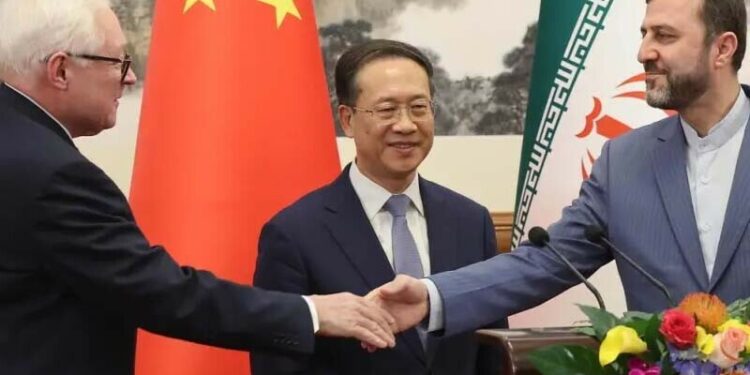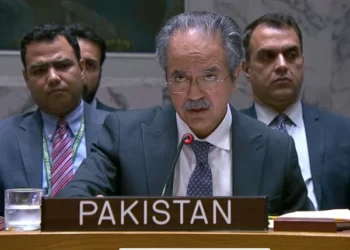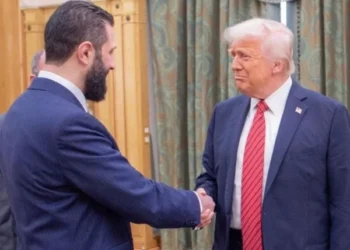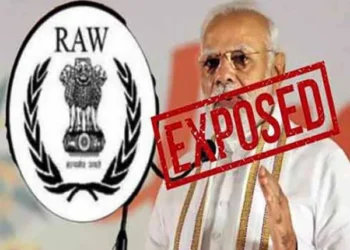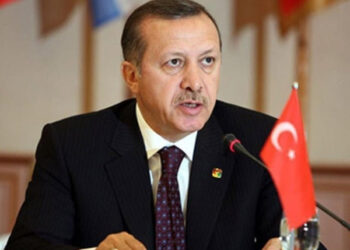China has once again called for the removal of ‘illegal’ sanctions imposed on Iran while hosting high-level diplomatic talks with Iranian and Russian officials. The meeting, held on Friday, is part of Beijing’s broader effort to revive long-stalled negotiations regarding Tehran’s nuclear program. This move underscores China’s increasing diplomatic role in global nuclear non-proliferation efforts and its growing strategic alliance with Iran and Russia.
Background: The Iran Nuclear Deal and Its Collapse
The Joint Comprehensive Plan of Action (JCPOA), commonly known as the Iran nuclear deal, was signed in 2015 between Iran and six major world powers—the United States, the United Kingdom, France, Germany, Russia, and China. The agreement aimed to curb Iran’s nuclear activities in exchange for lifting economic sanctions that had crippled its economy.
However, in 2018, then-U.S. President Donald Trump unilaterally withdrew from the agreement, calling it “deeply flawed.” The Trump administration subsequently reimposed stringent sanctions on Iran, leading Tehran to gradually scale back its compliance with the agreement’s restrictions on uranium enrichment and other nuclear-related activities.
Since Trump’s withdrawal, multiple attempts have been made to revive the deal, particularly under President Joe Biden’s administration. However, progress has been slow due to continued disagreements, particularly over Iran’s demand for full sanctions relief as a prerequisite for further negotiations.
China’s Diplomatic Efforts to Restart Nuclear Talks
On Friday, Beijing hosted critical discussions involving Iranian Deputy Foreign Minister Kazem Gharibabadi and his Russian counterpart Sergei Ryabkov. The meeting aimed to foster dialogue and renew negotiations on Tehran’s nuclear program.
Chinese Foreign Minister Wang Yi, who was present during the discussions, emphasized that the nuclear agreement is a landmark achievement of diplomatic negotiations. He urged all involved parties to work toward a peaceful resolution through political and diplomatic means rather than resorting to coercive measures.
“Now the situation has once again reached a critical juncture. We must buy time for peace, resolve disputes through dialogue, and firmly oppose the use of force and illegal sanctions,” Wang Yi stated.
The Chinese Foreign Ministry further released a statement urging the United States to demonstrate political sincerity and return to negotiations without preconditions. Beijing’s call reflects its consistent stance against unilateral sanctions and its advocacy for diplomatic engagement to address global security challenges.
Iran’s Position: Nuclear Program for Peaceful Purposes
Iranian Deputy Foreign Minister Kazem Gharibabadi, speaking at the meeting in Beijing, reiterated Tehran’s long-standing position that its nuclear program is strictly for peaceful purposes. He dismissed allegations of nuclear weapon development, attributing the current crisis to the U.S.’s unilateral withdrawal from the JCPOA.
“Our nuclear program has never been diverted toward military objectives. Unfortunately, some nations are creating unnecessary crises over this issue. The primary reason for the current situation is the unilateral withdrawal of the United States,” he said.
Iran has repeatedly argued that its nuclear activities, including uranium enrichment, comply with international norms and regulations. However, the International Atomic Energy Agency (IAEA) recently reported a significant increase in Iran’s stockpile of highly enriched uranium, raising concerns among Western nations.
Russia’s Role in the Talks
Russia, a key ally of both China and Iran, also took part in the discussions. Moscow has been a vocal critic of U.S. sanctions and has consistently advocated for restoring the JCPOA without additional conditions.
Russian Deputy Foreign Minister Sergei Ryabkov met with Chinese Vice Foreign Minister Ma Zhaoxu following the trilateral discussions. After the meeting, Ma reaffirmed Beijing’s commitment to promoting diplomatic dialogue and easing tensions.
“We have stressed the need to lift all illegal, unilateral sanctions. The relevant parties must work to eliminate the root causes of the current situation, abandon sanctions, pressure, and threats of the use of force,” Ma Zhaoxu said in a press briefing.
Moscow’s participation in the talks is significant given the increasing alignment between Russia, China, and Iran on global diplomatic issues. With growing economic and military cooperation, these nations are collectively challenging the Western-led sanctions regime.
Geopolitical Implications: A Shifting Global Order?
China’s push for renewed nuclear negotiations reflects its broader ambition to position itself as a key mediator in global conflicts. As the U.S. and its allies continue to impose economic and political pressure on Iran, Beijing sees an opportunity to strengthen its influence in the Middle East while securing energy resources critical for its economic expansion.
Additionally, China’s growing partnership with Russia amid heightened tensions with the West over the Ukraine war suggests an evolving geopolitical landscape where Beijing, Moscow, and Tehran are increasingly coordinating their foreign policies against U.S. influence.
What Lies Ahead?
The renewed push for nuclear negotiations comes at a time of heightened global uncertainty. The potential for a diplomatic breakthrough remains unclear, particularly as the Biden administration has yet to respond formally to China’s latest overtures.
If the U.S. re-engages with Iran under a revised agreement, it could lead to a de-escalation of tensions in the Middle East and a possible easing of global energy markets. However, if sanctions remain in place and Iran continues its nuclear enrichment program, the risk of military confrontations or additional economic retaliation could escalate.
For now, China, Iran, and Russia appear committed to challenging the existing status quo, advocating for diplomatic solutions, and seeking a world order less dominated by Western powers. Whether their efforts will lead to concrete results remains to be seen.
Conclusion
The Beijing talks signal a renewed diplomatic push to resolve the Iranian nuclear issue through peaceful negotiations. China’s call for lifting ‘illegal’ sanctions on Iran aligns with its broader strategy of challenging U.S. dominance in global affairs while reinforcing its role as a key diplomatic broker.
With Iran maintaining that its nuclear program is peaceful, and Russia backing diplomatic engagement, the success of future negotiations will largely depend on Washington’s willingness to ease economic restrictions. In the coming months, the world will watch closely as diplomatic efforts continue to navigate one of the most complex international security challenges of our time.
















